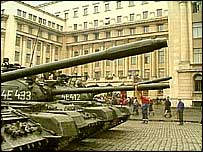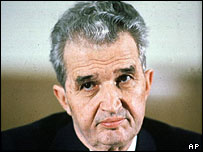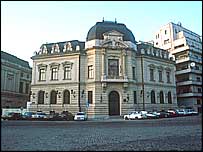


A chronology of key events:
1916-18 - Romania fights on Allied side during World War I. As part of the peace settlement at the end of the war acquires several territories with resident Romanian populations - virtually doubling in size and population.
Bucharest - Senate Square
Bucharest: Former 'Paris of East' endured disaster and dictatorship
Former capital of principality of Walachia
Capital of Romanian state from 1862
1977 quake killed around 1,500 people
Population: 1.9 million
1930s - Rise of fascist "Iron Guard" mass movement.
1938 - King Carol II establishes dictatorship.
1940 - Romania cedes territory to Hungary and USSR after signing of German-Soviet pact. General Ion Antonescu forces King Carol to abdicate in favour of son Michael, but assumes power himself.
1941 - Romania fights on German side against Soviet Union.
1944 - Antonescu ousted. Romania switches sides as Soviet forces close in.
1945 - Soviet-backed government installed.
1947 - Romania regains Transylvania under peace treaty but loses territory to Soviet Union. King Michael abdicates. Romanian People's Republic proclaimed.
1948-49 - Soviet-style constitution, purges of dissidents in the Communist Party.
1952 - Party leader Gheorghe Gheorghiu-Dej becomes prime minister.
1955 - Romania joins Warsaw Pact.
Under Ceausescu
1965 - Nicolae Ceausescu becomes Communist Party leader after death of Gheorghe Gheorghiu-Dej. He pursues foreign policy that runs "independent" of that of Moscow.
Romanian dictator (1980s picture)
Nicolae Ceausescu fostered personality cult, suppressed opposition
On This Day 1989: Romania's 'first couple' executed
1999: Ceausescu valuables on sale
1968 - Ceausescu denounces Soviet invasion of Czechoslovakia.
1975 - United States grants Romania most-favoured-nation status.
1977 - Bucharest earthquake kills around 1,500 people.
1985-86 - Austerity programme leads to food shortages and widespread power cuts.
1987- Army occupies power plants and crushes workers' demonstrations in Brasov.
1989 December - Demonstrations in city of Timisoara against the harassment of a dissident ethnic-Hungarian priest, Laszlo Tokes, trigger bloody national uprising.
Ceausescu and his wife Elena try to flee but are caught and then executed on Christmas Day.
National Salvation Front established, headed by Ion Iliescu.
Towards reform
1990 - Elections confirm Iliescu as head of state. New government of Prime Minister Petre Roman embarks on reform programme.
Tanks in Bucharest during 1989 revolution
Regime change did not follow a peaceful course
Romania's bloody revolution
On This Day 1990: Romanians call for government change
1989: Radio Bucharest reports overthrow
Securitate secret police replaced by new Romanian Intelligence Service.
Student and opposition protests against the ex-communist leadership are crushed when 20,000 coal miners are brought in to stage a counter demonstation.
1991 - Riots by miners on strike over soaring prices force Roman's resignation. He is replaced by Theodor Stolojan, who sees through a new constitution.
Rise in attacks against Roma minority.
1992 - NSF splits. Iliescu re-elected president. Nicolae Vacaroiu appointed prime minister of minority coalition government.
1994 - Members of ultra-nationalist Romanian National Unity Party appointed to government posts.
1996 - Centre-right election victory sweeps aside former communists. Emil Constantinescu elected president, Victor Ciorbea becomes prime minister.
1997 - Economic reform programme announced. Securitate files opened.
1998 - Ciorbea replaced by Radu Vasile after coalition tensions.
1999 January - Security forces prevent 10,000 miners striking over pay from entering Bucharest.
1999 December - Vasile replaced as prime minister by Mugur Isarescu.
2000 January - Toxic cyanide escapes from mining works in northern Romania and poisons rivers in Hungary and Yugoslavia.
2000 November-December - Ion Iliescu defeats far-right rival Corneliu Vadim Tudor to retake presidency. Leftist Adrian Nastase becomes prime minister in minority government.
2001 January - Parliament approves a law aimed at returning to its original owners property nationalised during the Communist era.
Bucharest street protest
Ongoing poverty, low wages have sparked protests
2004: Tough rebirth for Romania
2004: Brussels plans Bulgaria-Romania aid
2001 December - Ceausescu-era law criminalising homosexuality removed from statute book.
2002 November - Romania formally invited to join Nato at Prague summit.
2003 July - President Iliescu visits Russia. He and President Putin sign a new friendship treaty. Russia and Romania also issue a declaration condemning the 1939 pact between Stalin's USSR and Hitler's Germany as well as Romania's alliance with the Nazis in the early years of the war.
Path to EU membership
2003 October - Romanians vote in a referendum on a new constitution meant to bring their country into line with members of the European Union.
2004 March - Romania admitted to Nato.
2004 October - President Iliescu ends decades of denial by admitting Romanian complicity in Nazi-driven Holocaust of World War II when hundreds of thousands of Jews and Romanies were sent to their deaths by the country's fascist leadership.
2004 November/December - Centrist alliance leader Traian Basescu elected president. His ally Calin Tariceanu becomes prime minister. Both pledge to speed up EU-oriented reforms.
2005 April - Romania signs EU accession treaty, putting it on course to join in 2007 provided reforms are implemented in time.
2005 May - Parliament ratifies EU accession treaty.
2005 July - New leu currency introduced as four zeroes are stripped from old leu as part of preparations for planned EU entry.
2005 July-August - More than 30 people die and thousands are left homeless as torrential rain causes severe flooding.
2005 December - US Secretary of State Condoleeza Rice visits, signs agreement which will allow US to use Romanian military bases.
2006 February - Former prime minister Adrian Nastase is charged with corruption. He insists that he has done nothing wrong.
2006 September - European Commission confirms that Romania - and Bulgaria - will join the EU at the start of 2007, although under strict conditions.


No comments:
Post a Comment